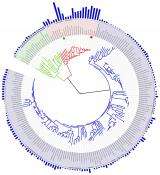December 11, 2009 weblog
Evolution may take giant leaps

(PhysOrg.com) -- A new study of thousands of species of plants and animals suggests new species may arise from rare events instead of through an accumulation of small changes made in response to changes in the environment.
The traditionally accepted idea of species evolving through gradual changes is the Red Queen hypothesis, named after a character in Alice in Wonderland, who explains to Alice that "it takes all the running you can do, to keep in the same place." The hypothesis, that species continually change and adapt to compete with co-evolving species and retain their ecological niche, was proposed in 1973 by Leigh Van Valen.
The new research, carried out by Mark Pagel and colleagues at the University of Reading, in England, studied 101 groups of plant and animal species and analyzed the lengths of branches in the evolutionary trees of thousands of species within these groups. The lengths of the branches are a measure of the time elapsed between two species branching off.
The researchers then compared four models of speciation to determine which best accounted for the rate of speciation actually found. The Red Queen hypothesis, of species arising as a result of an accumulation of small changes, fitted only eight percent of the evolutionary trees. A model in which species arise from single rare events fitted eighty percent of the trees.
Dr Pagel said that the research shows speciation is the result of rare events in the environment, such as genetic mutations, a shift in climate, or a mountain range rising up. Over the long term new species are formed at a constant rate, rather than the variable rate Pagel's team expected, but the constant rates are different for different groups of species.
The work suggests that natural selection may not be the cause of speciation, which Pagel said "really goes against the grain" for scientists who have a Darwinian view of evolution. The model that provided the best fit for the data is surprisingly incompatible with the idea that speciation is a result of many small small events, Pagel said.
The paper is published in the journal Nature.
More information: Venditti, C., Meade, A. & Pagel, M. Nature advance online publication (2009); doi:10.1038/nature08630
© 2009 PhysOrg.com















